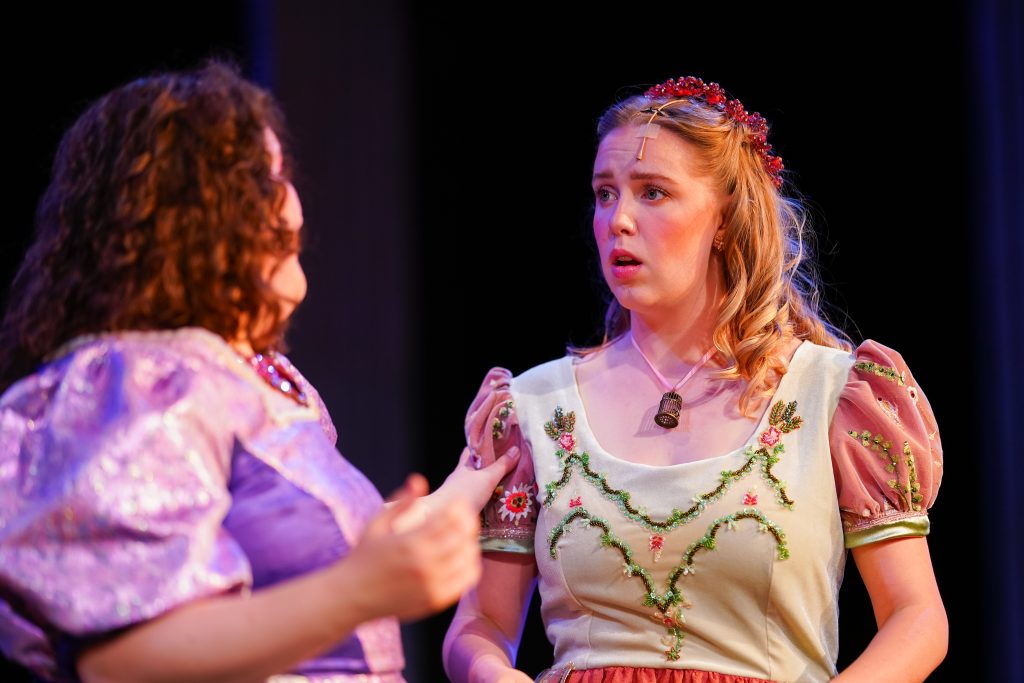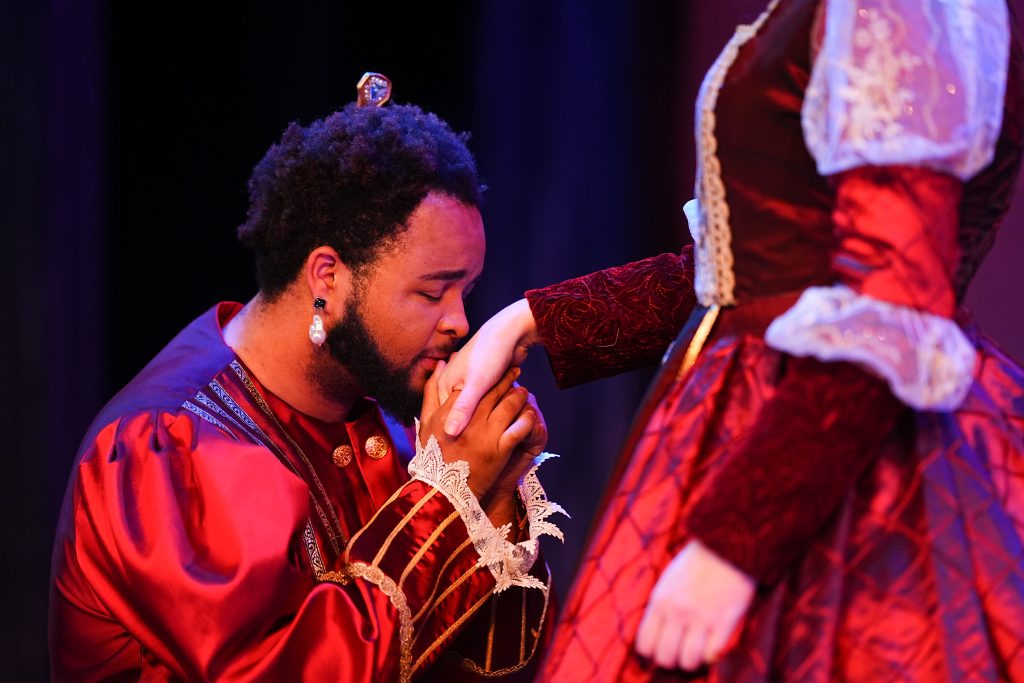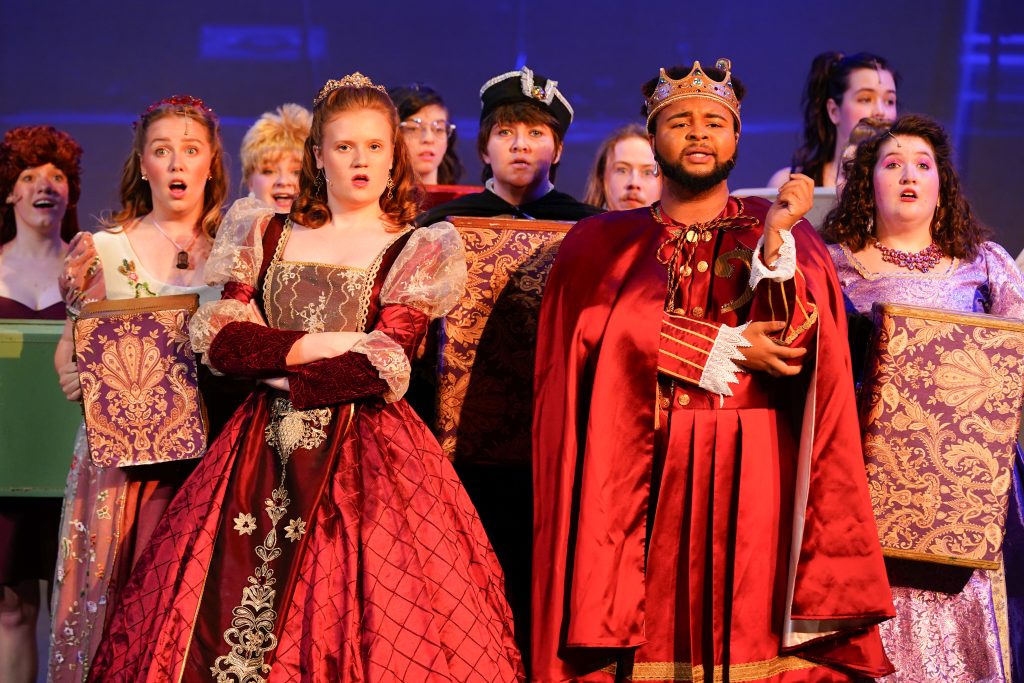On the weekend of April 8 , Jewell Theatre Company put on its spring show: the musical “Head Over Heels,” a jukebox musical featuring the music of the Go-Go’s. The Hilltop Monitor had the opportunity to sit down with cast and crew members from the production—here’s what you may have missed from the show!



What was your favorite song or dance from the show?
Ivan Calderon (Musidorus/Cleophila): “We didn’t play the full song in the show, but ‘Lust to Love’ is hands-down my favorite song. […] In the show, we get to add fight choreography to it, so it’s epic, it’s so much fun. Every time, I remember leaving—especially during tech week—leaving rehearsals just blasting ‘Lust to Love’ on repeat… That was my anthem throughout the week.”
Lianna Morelli (Mopsa): “My favorite song is probably ‘Automatic Rainy Day.’ My favorite dance, though, was the dance we did in “Head Over Heels,” which was the opening to Act 2. I just had a really good time with it.”
Cal Perkins (Dametas): “I have to say I’m torn between two. ‘Here You Are’ is my favorite song for sure. I just love the different harmonies and just the lyricism that’s beautiful with the actual motion. It’s tied with ‘Vision of Nowness’ for sure. I didn’t really get to dance in that, but it was so hard not to sing during it because that’s my favorite Go-Go’s song for sure.”
Who was your favorite character?
Calderon: “Standouts for me would be Basilius [played by Marquis Williams] and Pamela [played by Emma Kelly]. I like both of them a lot. For me, just being a scene partner, particularly with Emma, who played Pamela. Getting to witness the sass sometimes led me to almost breaking [character] on stage.”
Morelli: “Honestly, I just think [Queen] Gynecia [played by Kassidy Schmidt] is a badass. She put up with being cheated on for a really long time, and I love her character arc, and I love that she gets to take over the kingdom at the end.”
Perkins: “Basilius is definitely one of my favorite [characters]… Just being able to be on stage with Marquis and kinda just being there for the journey [that Basilius goes on] […] It’s just so fun to experience. I would honestly say I really do love Mopsa as a character. This is maybe the Demetas in me talking. [She’s] such a strong character and she is the more serious of [Mopsa and Pamela], but then again, she speaks to woodland animals. I mean, that’s baller, so I just love her character. She’s so fun.”
How did you handle playing a character that was less accepting of queer identity than you?
Perkins: “When I got cast [as Demetas], I was like, ‘Okay, this will be a change,’ and then realizing that he becomes an ally at the end was relieving, honestly. Aside from that, I have a lot of my family [that] doesn’t want to touch anything LGBTQ+ or anything of that sort. So I kind of had to think about what [my family] would think and what Demetas’s journey has been. It was a little interesting as someone who is trans/genderfluid, being on a stage and trying to play a cisgender man who exiled his partner and is realizing that his daughter is lesbian. The character arc was so interesting to play with and think about.”
What did you enjoy about the queer aspects of your characters?
Morelli: “Mopsa explores more of the sexuality part than the gender side of [queer identity]. It was interesting for me to try and find where Mopsa is in trying to get Pamela to have [the] realization [that she is a lesbian] because you see it throughout the show. Especially in the poetry scene, Pamela’s very close to realizing what it is that she wants. And Mopsa says, ‘You’re so close, you’re right there,’ and the whole time she’s trying to do it without being too pushy.”
Calderon: “I like how Musidorus subverted the trope of the heroic journey. He doesn’t really have the means to be a knight or a warrior or a hero of any standard means, but then he is bestowed this power [that we see in the fight scenes]. [Playing Musidorus] allowed me to not feel restricted on stage to any extent… as an actor, I just had a lot of fun on stage being confident in my body and myself and doing my thing.”
What do you hope audiences take away from the production?
Emma Kelly (Pamela): “The message I wanted to give is to be seen. I want people like this [i.e., queer people] to be seen. Pamela from the beginning—she loves herself, but she doesn’t know what else she loves. There’s clearly something missing, and I think there’s a lot of people out there that struggle with knowing that there’s something different but [not quite knowing] how to articulate it. […] A lot of times, people don’t know these relationships [exist] because they don’t actively see them… But a show like this is making people see [queer relationships] and hear about [them] in a way that is palatable—in a way that is understanding.”
Marquis Williams (Basilius): “Breaking traditions and change can benefit everything. Basilius is such a man of tradition. And the reasons why he made the decisions he made was that he felt threatened. He’s like, ‘I can run the kingdom.’ And that was in the beginning. But once he decided to accept change, that’s when everything ended [better than it was initially]. Change breaks traditions and breaks boundaries.”
Calderon: “I really wanted people to find entertainment from this [production]. […] Of course, we want our audience to enjoy themselves because then there’s that feedback and energy where we raise the state [of the show] or raise the energy as well. People who haven’t seen this kind of media before aren’t really used to seeing queer representation on stage. [Those people will] just find enjoyment in seeing it. […] To some extent, even though maybe there are some aspects where older audiences or more conservative audiences won’t really agree with certain aspects of the show, at least they’ll connect with it, which will allow that representation to be seen as good entertainment as well, but also in a way that’s done correctly and thoughtfully and meaningfully.”
Morelli: “There’s a line in the show that says, ‘No true paradise remains in place forever.’ I think that sums up what I want people to take from the show. […] Things change and things happen and you have to be accepting of that change. As people are discovering who they are, as people come out, as people make these self-discoveries, it’s so important for the people around them to just be there and be accepting and be loving and kind with the way they interact and they speak to them, no matter what they think about it. It’s good. Change can be good. Change encourages progress. And I think that to create the truest paradise we just have to be accepting.”
Concluding Thoughts
Jewell Theatre Company’s “Head Over Heels” was a breath of fresh air. The cast placed significant emphasis on queer representation in the show; seeing queer people and relationships in media is crucial to build a more accepting future. Plus, the company’s “Head Over Heels” production was good theater. I cannot wait to see what JTCo comes up with next!
To see more performances from Jewell’s Department of Performing Arts, check the Department’s performance calendar here. You can also follow @jewelltheaterco on Instagram.
